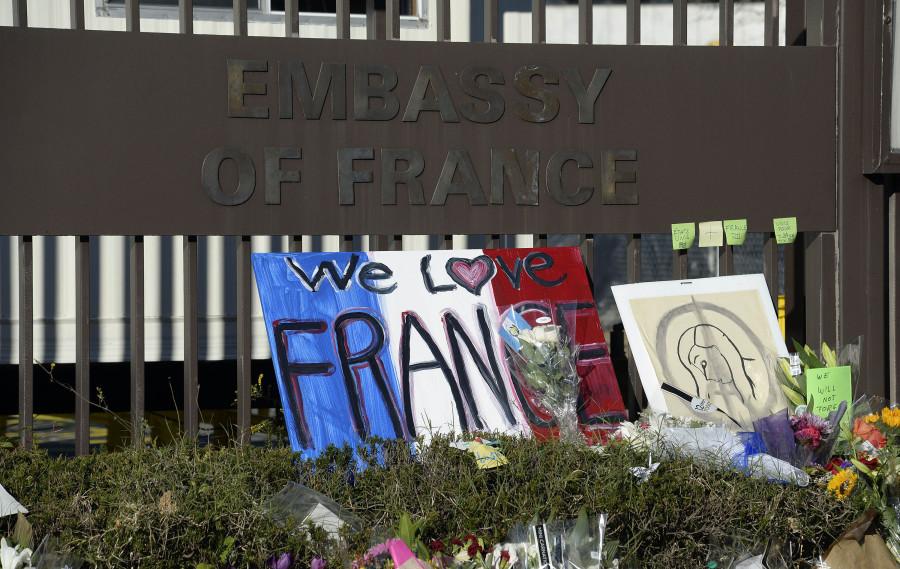Be skeptical of ‘rhetoric of terror’
Signs and messages of support have been left at a memorial for the victims of the Paris terror attacks at the Embassy of France in Washington, D.C., on Sunday, Nov. 15, 2015. People gathered in cities around the world to show support for Paris following the coordinated assault that left at least 129 people dead and over 350 injured. (Olivier Douliery/Abaca Press/TNS)
Nov 16, 2015
Whenever tragedy or terror occurs, the events are often used to push forward political agendas. The tactic is old and easy. It is important, as an active citizen and a participant in the democracy, to preemptively trace the causal lines that are likely to be drawn by those with ulterior motives and to meet these proposed causalities with ruthless skepticism. If such mental fortifications are not made, then we leave ourselves open to being ideologically recruited.
With that in mind, turn your attention to the recent acts of terror in France. The attacks in France on Friday night coincide with a couple relevant political issues. These are likely to be the alleged causes for the acts of terror.
First, there is the issue of mass European Immigration and the refugee crisis. Even without counting the Syrian refugees, immigration to Europe has been on the rise. According to the European Commission, between 2010 and 2014 approximately 1.4 million non-nationals immigrated to the EU through proper channels.
The EU Schengen Agreement of 1985 also complicates the issue because EU citizens are free to travel within the member states. The refugee counts for 2015 is about 500,000. Sources on Sunday reported that one of the attackers actually did enter the EU with a refugee population. The stage is set, and it is pretty clear how these attacks could be used to justify stricter immigration and border policy.
Second, there is the issue of foreign policy and the war in Syria. France has been conducting airstrikes on targets in Syria since late September of this year. The United States conducted airstrikes on Thursday, the day before the attacks in France, and it is believed that Jihadi John, a British-born jihadi who is seen in the ISIS videos, was killed. The entrance of Russia has also escalated the conflicts there.
It is possible that people will argue that the response of western countries in the region is instigating the reactionaries to do violence, and that perhaps it is best to limit or remove military support in the region. Similar arguments, ones that favor the interests of the attackers, have been made shortly after the Charlie Hebdo shooting. Just as nationalist-leaning politicians will use the attacks in Paris to justify tightening border policies, left-leaning politicians will use the attacks in Paris to justify easing the foreign policy.
Before any such lines are drawn, it is important to investigate the nature of the attacks in France. The terrorist attacks were not political in nature. I’m going out on a limb here, but it seems to me that these attacks were more representative of truly archetypical terrorist attacks. Why is it that the attacks were conducted in places of day-to-day French life: cafes, random streets, a theatre, and a soccer stadium, but not political targets like monuments, legislative buildings, or places where politicians usually meet?
Faisal Saeed Al Mutar spoke about Muslim extremism this year at UNIFI’s annual Darwin Week and gave some insight into the nature of these attacks and the motivation behind them. I will paraphrase, but he said that Muslim extremists hate western life: good food, fine wine, a night with good company. For these people, the “good things” western society has to offer doesn’t have any appeal in the face of an eternal existence in Heaven with 42 virgins. With that in mind, I think it is folly to associate worldly political motives. Also with that in mind, a discussion about uprooting extremism is required if any success is to be had.
It is not my intent to propose a solution to this incredibly complex issue. I only want to remind everyone to be skeptical of the incoming rhetoric. Don’t let someone’s heated knee-jerk reaction win you over without putting up a fight – meet their assertions with questions and meet their finger pointing with alternative suggestions.








